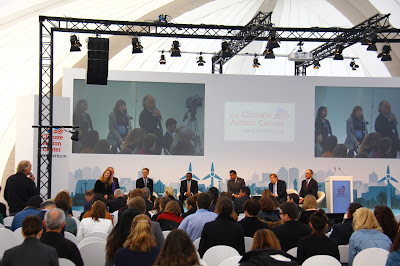The ocean in the climate negotaitions
 | |
| Ministers from Chile and Honduras shake hands after Honduras joins the #BecauseTheOcean declaration at COP 23. |
“A healthy climate requires a healthy ocean, and a healthy
ocean requires a healthy climate.” This simply stated recognition of the fundamental role of
the biological carbon pump and ocean heat sink in controlling global climate
and the profound disruption of marine ecosystems and the livelihoods of people
that rely on them caused by anthropogenic climate change and ocean
acidification has underpinned the work of a dedicated group of countries, NGOs,
and scientists who have been working since the meeting in Paris two years ago.
These
groups have been working to “bring the ocean into the UNFCCC process.” In
Paris, the #BecauseTheOcean declaration, led by Monaco and Chile, with support
from Tara Ocean Expeditions and the Ocean and Climate Platform, (1) called for the
word “ocean” to appear in the Paris Agreement (it did – a first since 1992 for
a climate treaty), (2) called for a new IPCC special report on the ocean to be
initiated (it is being written by the world’s scientists), (3) called for support
a first ever UN Ocean Conference in 2017 led by Fiji (it happened in New York –
UMaine was there!) and (4) called for a greater recognition of the ocean in
future climate negotiations. About 20 countries signed this declaration in 2015,
and now there are around 50 countries that have signed on to the ocean group.
Here, in
Bonn, this work is coming to a head with the anticipated announcement of a new
Ocean Pathway, which will be announced by Fiji on Thursday November 16th.
The Ocean Pathway is still being drafted, but we anticipate that it will lay
out specifics for how ocean actions can be written into national pledges for
climate action. Such actions might include coastal climate adaptation and
resilience plans, national ocean policies that take into account climate
change, more marine protected areas that increase climate change resilience, national
ocean acidification action plans, a call for more actions to enhance blue
carbon sequestration, and support for the Blue Economy (we don’t know what will
be in the final document yet, but one of the things I have been following here
is its negotiation and development). But what
will it mean to do a better job of including the oceans in the climate
negotiations and what will that accomplish? The goal of this work seems to be
to provide a common framework for countries to make individual pledges and,
potentially, to allocate funding for ocean and marine sustainable development that
will help protect marine ecosystems and adapt to and avoid the harms of climate
change in our ocean ecosystems. So far, that kind of work has been external to
the UN climate negotiations, which have had a tremendous focus in the past on
forest ecosystems. This time, with Fiji leading the meeting, it seems it is the
ocean’s turn to take center stage.




Comments
Post a Comment